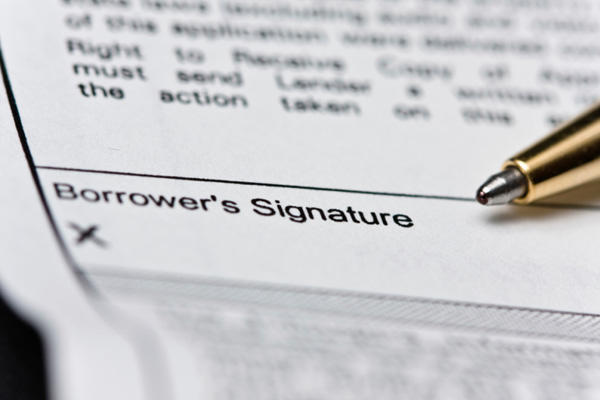For borrowers with less than pristine credit or a scant money-management record, being approved for a loan today can be a struggle. With the help of another credit-worthy signer who will vouch that the debt will be repaid on time, the odds of securing a credit card, car loan, mortgage, debt consolidation, or a private student loan improve dramatically.
But USAA Certified Financial Planner practitioner June Walbert offers this advice: Don't do it.
"It's important to remember some folks need a cosigner for a reason: they have bad credit," says Walbert. "Are you willing to take on that risk when the bank won't?"
Before lending your signature to another person's debt, Walbert urges you to consider these nine pitfalls:
- If your friend or family member doesn't make the payments, you're guaranteeing you will. You're assuming the same responsibilities as if you were applying for the loan yourself.
- Things can go sour fast. If a borrower misses even a single payment on a loan, a wary lender may demand full repayment of the entire outstanding balance on the loan immediately.
- The total amount owed may add up to far more than the original loan amount. If the borrower falls behind in payments or defaults, additional penalties, including late fees, higher interest rates, and other charges can pile on top of the amount owed.
- If the borrower defaults on the loan and it moves into the collection process, the lender can head straight to you to collect the debt in most states.
- The creditor can use the same collection methods against you as they would the borrower, which can include legal action against you.
- You could be putting your personal credit report and score in jeopardy. If the person whose loan you're guaranteeing habitually makes late payments, your credit will be damaged. And if the borrower makes late payments or defaults on the loan, the black mark on both of your credit reports will linger for seven years.
- If your credit score takes a hit, it can ripple throughout your financial life. The lower your credit score, the higher the interest rates you could be charged for loans you take out for your own purposes. Lower scores can bump up the amount of money you pay on auto and homeowners' insurances. Premiums are based, in part, on your credit history.
- The fact that you cosigned on someone else's loan may reduce the amount you can borrow.
- Your initial generosity could result in damaged relationships if the loan goes unpaid.
Why Someone Will Ask
The question of whether or not to cosign for a child's credit card, in particular, has received attention lately. That's because under new credit card laws, applicants younger than 21 years of age are required to show they have the income to make minimum payments, or they must have a cosigner who can take responsibility for the money owed.
Still Willing to Take the Gamble?
- Make sure you get copies of all the loan documents, plus the repayment schedules.
- Ask the lender to notify you as quickly as possible, should the borrower miss or be late with a payment. By learning of any problems early on, it will help you prevent potential damage to your own credit report from getting out of hand.
- If possible, limit your liability to the amount charged, so you won't be liable for late fees and attorney costs. For more information, check out the FTC's Facts for Consumers publication, "Cosigning a Loan."
For more information on loan and loan eligibility, visit Military.com's Finance channel.













